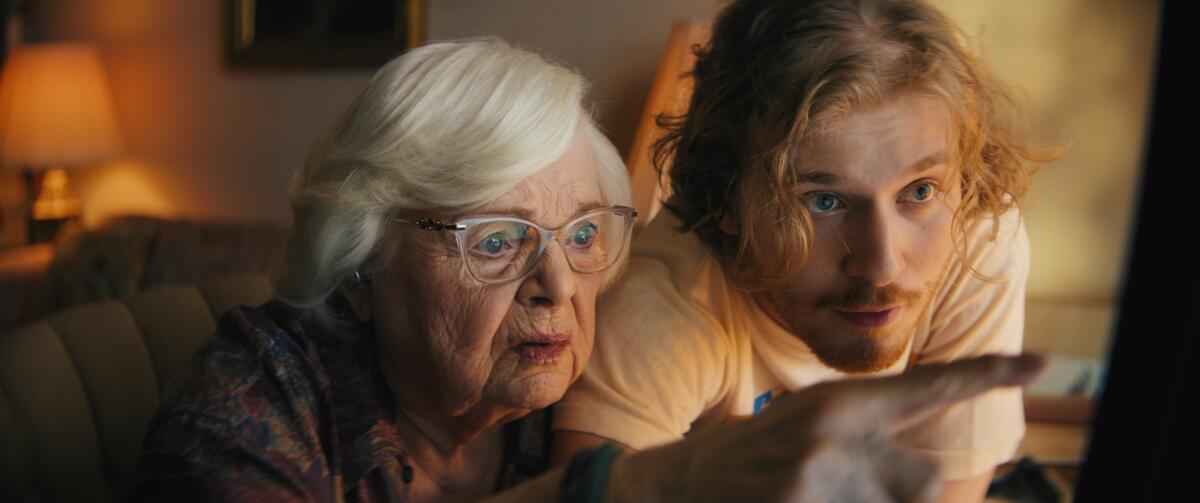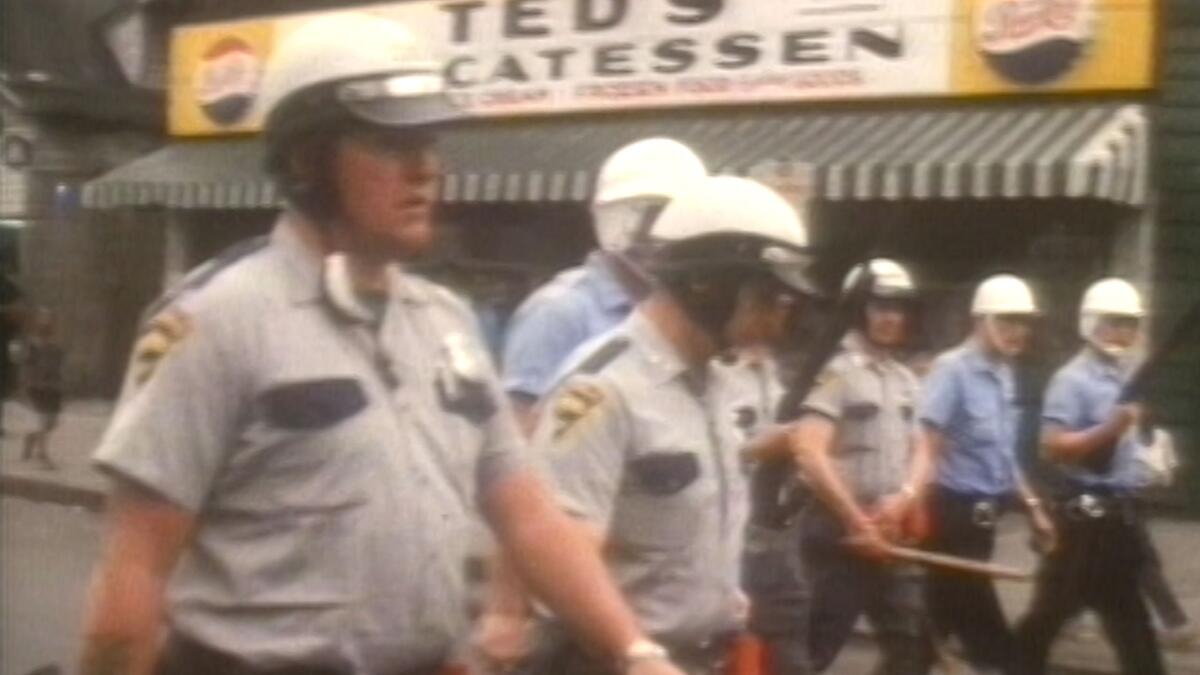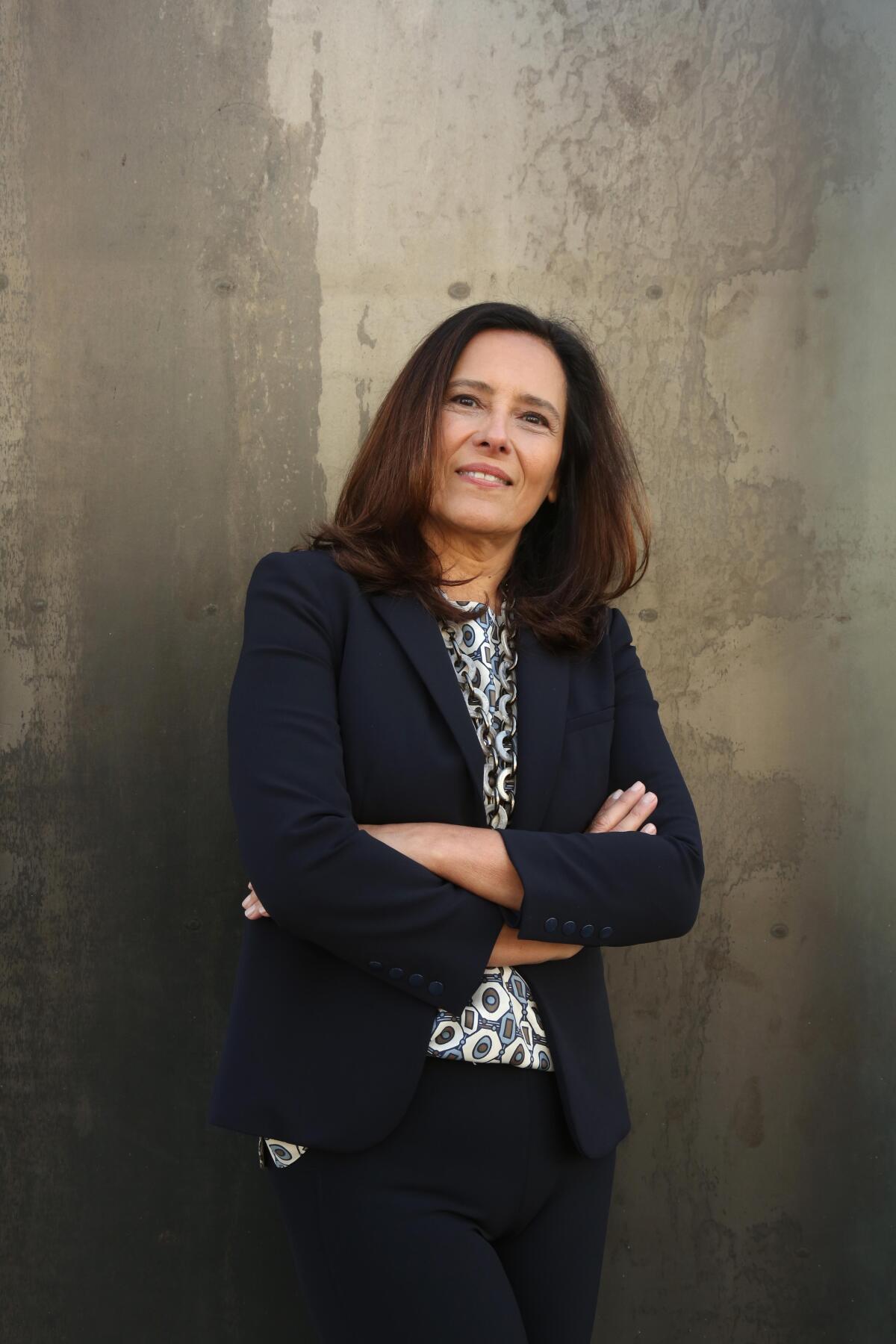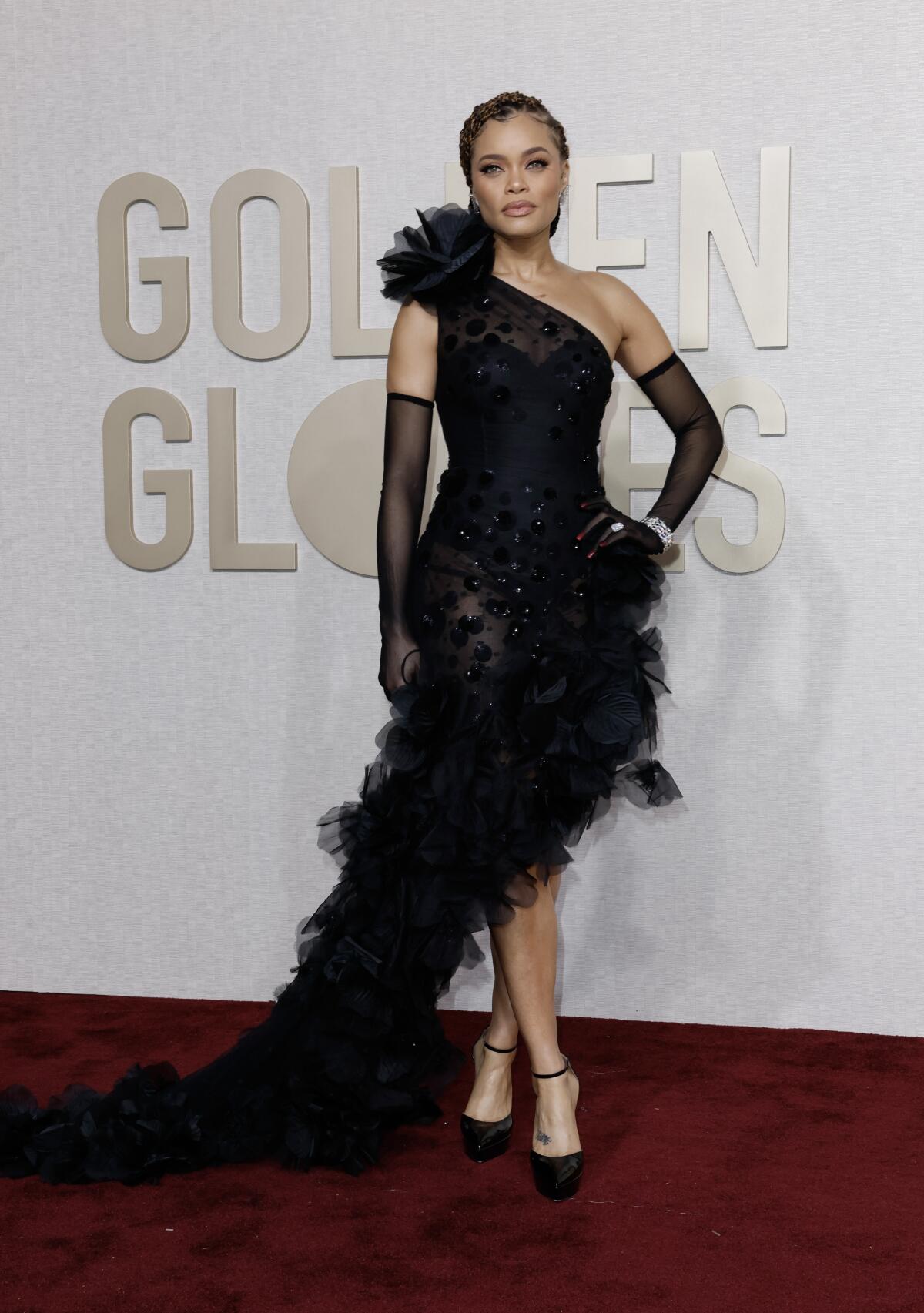Increasing costs. Advancing tech. Why Sundance CEO says film festivals need to evolve
- Share via
PARK CITY, Utah — Welcome to a special Sundance Daily edition of the Wide Shot, a newsletter about the business of entertainment. Sign up here to get it in your inbox.
What to expect for Friday, Jan. 19
Greetings from the 40th edition of the Sundance Film Festival! In case you missed our world premiere at last year’s festival, the Wide Shot’s Sundance Daily is a roundup of reviews, interviews, news and events listings from our team on the ground in Park City, delivered to your digital doorstep each morning of the festival’s first weekend. Join us today through Monday to help sort through the schedule and figure out what to see, what to skip, and what everyone’s buzzing about (or should be).
READ MORE: ‘American Movie,’ about a ‘Blair Witch Project’ that wasn’t, predicted Hollywood’s future
The movies worth standing in line for

“Thelma” (9 a.m., Prospector Square Theatre)
Josh Margolin’s comic caper, about a 93-year-old widow (June Squibb) determined to retrieve the $10,000 she’s lost in a phone scam, has plenty of chances to wrong-foot itself: Too gritty and it could lose its sense of humor, too sweet and it could just seem twee. That it doesn’t is credit to Margolin’s supremely funny script, which peppers a recognizable family dynamic — willful grandmother, overbearing parents, helpless child — with highly specific jokes, all of which the actors, including Fred Hechinger, Clark Cregg and Parker Posey, deliver with brazen commitment. (“How can Zuckenborg let this happen?!” will be entering my personal lexicon for the depredations of Silicon Valley.) Indeed, for all its riffs on action-movie convention, “Thelma” is most effective, and assured, as a portrait of a “tough cookie” determined not to let the modern world, or what’s left of her life, pass her by — pesky pop-up ads be damned. With the late Richard Roundtree, in his final film role, as Thelma’s loyal, and mercifully practical, companion. —Matt Brennan

“Power” (noon, Redstone Cinemas 7)
The problem of America’s militarized, overly aggressive policing has long deserved a documentary of its own. “Power,” the one that’s arrived from filmmaker Yance Ford (“Strong Island”), boils with rage and indictment. As one viewer said Thursday during the Q&A following the world premiere, this is a nauseating film to watch — which makes it all the more essential. Charting the rise of today’s super-armed police force out of slave patrols and urban crowd control, Ford brings clarity to the examination of such fear-based tactics as stop-and-frisk and chokeholds, situating the rise of police brutality as primarily a racial issue. Don’t go in looking for a legislative savior: The film’s parade of pro-police presidents, from Lyndon Johnson and Richard Nixon (who expressly used crime in his scare campaigns targeted at suburban whites) to Barack Obama and Joe Biden, is the movie’s most effective head of steam. This was almost too good a Sundance movie to begin with: I’m a furious, shaken wreck. —Joshua Rothkopf
READ MORE: The 10 movies we’re most looking forward to at Sundance 2024
Movers and shakers from around the fest

No one could accuse Sundance Institute CEO Joana Vicente of coasting. Since joining the organization from the Toronto International Film Festival in 2021 — smack in the middle of the COVID-19 pandemic — the longtime producer has put on a last-minute virtual festival and directed an in-person one, all while tasked with shepherding Sundance through a time of tribulation for American independent cinema, at least of the economic variety. So you’ll forgive her if she’s ready to celebrate her perch a little this time around.
“What Sundance does, probably better than anyone, is to be a place that takes chances, that embraces discovery, that really finds the diamond in the rough,” she says. “That’s that sense of like, ‘Here’s the place that maybe I can be heard that maybe other festivals don’t provide a platform.’ And I think that is so Sundance.”
On the eve of the festival’s landmark 40th edition, Vicente spoke to me via Zoom about what new director Eugene Hernandez brings to Sundance, creating a stable center for indie film in at an uncertain moment and her favorite titles from festivals past. —Matt Brennan
READ MORE: Sundance’s new director Eugene Hernandez keeps festival’s legacy in mind — and its future
Talk about one moment in the leadup to the festival where you felt Eugene’s distinctive stamp come into play.
We’ve seen so many changes and disruption of the industry, from the impact of the streamers [to] the pandemic... It’s gotten so complicated that it was important for me to have someone who was going to be really attuned to the needs of the field. For me, it’s less important at this moment [to say], “Here’s what the new festival is going to be” than celebrating this incredible legacy of 40 editions of the festival, remembering [founder Robert] Redford created this place as an experiment and as a platform for alternative kinds of films, for films that are not necessarily given the opportunity, given the voice.
For Eugene, one of the things that was really important for him is just how meaningful this festival is for filmmakers, for press, for industry. How do we give that film the best possible launch? What are those first impressions like? And really focusing on creating the best platform for that.
This year’s festival saw about 17,000 submissions, a record number. What do you think is fueling the continued growth of filmmakers’ interest in participating even against a backdrop where there’s a lot of uncertainty about both independent cinema and cinema more broadly?
I’m at the Screenwriters Lab this week — I’m going to Park City later today — and I always feel like it’s such a grounding moment to remind myself of the work that we do. To have these incredible advisors back here, taking chances reading these first-time filmmakers’ scripts, see what the possibility is, and what a diverse, incredible range of stories that we have not heard before. It’s that space that is really, really special.
There might be like 80 films that don’t have distribution. Who knows what will happen? People will stand back to see what the bigger players will do first. The world is not the same as it used to be. International salespeople are not immediately buying films, because they’ve kind of been shut out of the films that go with worldwide deals. But at the same time, when a film sparks, somehow I feel that’s what helps the industry remember, “These are films that will connect with audiences. These are films that people will be talking about for the next year.”
If I’m not mistaken, 2023 was your first in-person Sundance because of the timing of your arrival to the organization. What surprised you or struck you most about the in-person experience, and how have you applied it to your preparation for this year’s edition?
Nothing replaces the real conversations, being in the room seeing that filmmaker presenting their film for the first time... there’s a responsibility for us to continue to make this possible.
But at the same time, [there’s] this realization that the world has changed, that things are more expensive, that technology has advanced. How do we create the optimal model to have this in-person festival that is not exactly what it used to be, that needs to figure out how it can have the most impact? It needs to be responsibly done within the economy of means that we have. And how do we, most importantly, make it an accessible experience?... That’s a big, big priority for us, and that’s how we want to evolve the festival. The way that we used to do festivals needs to be reexamined.
Y’all just released the results of your poll of Sundance friends and family of the top 10 Sundance films of the last 40 years. What was on your ballot?
I was very privileged and fortunate to have had many films at Sundance that I produced, and those are kind of like my children. And it’s extremely fortuitous that the programming team chose one film that I produced that is celebrating its 25th anniversary, [“Three Seasons.”] It was the first film that got all of the Audience Award and Grand Jury Prize and [Excellence in] Cinematography. There was a 25-year-old director, Tony Bui, who I met while he was going through the labs at Sundance. To me, that’s a very special film, very emotional. It was incredibly difficult to get made, the first American film shot in Vietnam.
I saw the top 10 list. They’re all incredible, but “Little Miss Sunshine” has a special place in my heart. I just remember being in that screening so, so vividly... There was this sense like you jumped off your seat, and you know, and just wanted to share how you felt.
Where you’ll find us in Park City today

If you’re among the Golden Globes viewers who yelled, “Let Andra Day host!” at their TV after she and Jon Batiste presented best score on the Jan. 7 telecast, Friday is your chance to support her quest to rename the category “best performance by a musical note prepared by a musician to elicit feelings [in a] motion picture” in person.
That’s because Day (“The United States vs. Billie Holiday”) will be in conversation about the intersection of entertainment and advocacy with Kyle Bowser, senior vice president of the NAACP’s Hollywood Bureau. The hour-long event, moderated by Variety’s Angelique Jackson, will take place at 1 p.m. at the Adobe house, 558 Main St. While you’re there, you can congratulate the Grammy-nominated Day on the news that she’ll be singing during the Super Bowl pregame Feb. 11.
You’ll be just in time to pop over to the “Cheers, Queers!” event, held by recent TV academy Governors Award recipient GLAAD, Frameline and NewFest at Acura House of Energy, 550 Swede Alley. Programming begins at 2 p.m. with a “Queer Film Is Activism” panel moderated by GLAAD’s Anthony Allen Ramos, followed by a Champagne toast and mixer from 3:30-5 p.m.
Then, close out the evening — or maybe just kick it off? — with a double helping of Alabama Shakes’ Brittany Howard at the White Claw Shore Club (608 Main St.), where she’ll be holding a “What Now” listening session and “moderated storytelling experience” at 5 p.m. and DJ-ing a set at 8 p.m. If you’re still standing after that, you’re a more intrepid festivalgoer than I. —Matt Brennan
The Wide Shot is going to Sundance!
We’re sending daily dispatches from Park City throughout the festival’s first weekend. Sign up here for all things Sundance, plus a regular diet of news, analysis and insights on the business of Hollywood, from streaming wars to production.
You may occasionally receive promotional content from the Los Angeles Times.



